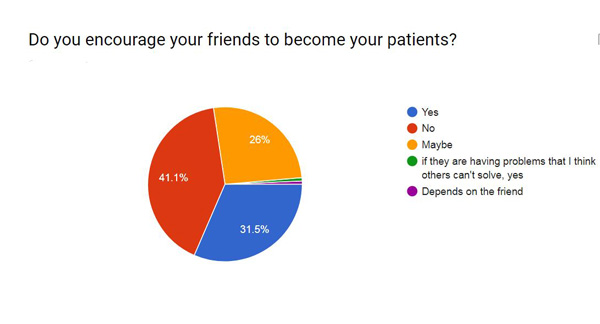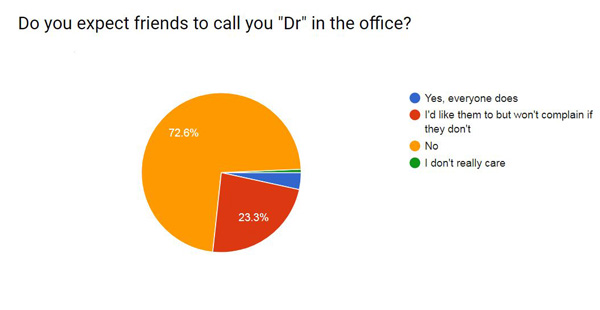Be My Friend, Not Necessarily My Patient


For many ODs, having a separation between friends and patients might be a good thing. In a recent Women In Optometry (WO) Pop-up Poll, 41 percent of respondents said that they do not encourage their friends to become their patients, while nearly 32 said that they do encourage that connection. Another 27 percent said maybe, noting that it depends on the friend or the circumstances.
Most ODs, nearly 73 percent, said they do not expect their friends to call them “Dr.” in the office, although nearly one-quarter (23 percent) said that they would like their friends to do so, but won’t complain if they don’t, and just more than 3 percent said that everyone calls them “Dr.” so they expect that their friends would, too.
Most ODs noted that having friends as patients can be challenging, with the biggest impact being on the schedule itself. “We tend to chat longer than we should,” said more than 67 percent of respondents. One third of the respondents said that they feel more stressed if they’re behind schedule and a friend is in the chair or waiting. About 31 percent said that it can be awkward having financial or health information on a friend, and 16 percent said that it can be physically awkward in the exam room. Others wrote in that managing expectations from a friend/patient can be difficult: they expect access 24/7 or they may expect breaks or discounts in exam fees or products. Others noted that it can be difficult to give a friend bad news or it can be challenging if the friend is unhappy with the services or products.


Nearly 10 percent of respondents said there is no challenge at all to having friends as patients.
Most friends who are patients get to stay that way, although 4 percent of respondents said that they have had to “fire” a friend as a patient, and slightly more than 3 percent said that maybe they did.
Nearly 150 people responded to this Pop-up Poll; about 84 percent were women ODs and 13 percent were male ODs. The remainder work in the industry but are not ODs.
Here are some responses from ODs and staff on the topic:
“Some of my friends are more likely to listen to my advice/prescriptions than others so those are the patients I want.”
“My friends tend to be my family. One of my best friends started as a patient who developed low vision (LV) from macular degeneration. She didn’t trust anyone else but me to explain to her what was happening to her vision when LV came on. I was very friendly with her ophthalmologist because she made him send all of her exam visit notes to me. I miss her since she passed at 90 years old.”
“With friends I never push our office or services. I let them know I’d love to help them and their families but I don’t want our practice to get in the way of our friendship. Whenever I post a trunk show or new line on my private Facebook I always say ‘We’d love to help you or a friend who may need new glasses. No pressure to buy from us!’”
“Some of my patients have become great friends.”
“I personally prefer not to see friends unless they request. I feel as though most friends will expect discounts and the extra time and at the end of the day I am not sure if it is best for the friendship.”
“I usually have my friends come in as the first patient of the afternoon; sometimes I even tell them their appointment is a few minutes earlier than our book says, and I’ll come back from lunch early. Alternatively, we go to lunch and then have the appointment. I have no control over billing so that has never been an issue. However, many of my friends are in health care (many are also optometrists) so perhaps that explains why I have not experienced issues.”
“The biggest problem I find with some ‘friends/acquaintances” is that they expect free access to me at all times and expect and bigger discounts when they patronize our office.”
“I do feel obligated to give friends a discount, even though they don’t ask. To prevent issues like insurance fraud and to make sure I’m not compromising my staff’s income or bonuses, I only offer free retinal imaging. All friends still owe their exam co-pays, and I don’t offer discounts for friends on eyewear or contact lens purchases above and beyond what’s offered to all of my patients.”
“Keep accounts payable questions with the AP clerk/office personnel; distance yourself when dealing with a friend.”
“I take care of my friends…just like a dentist friend, or a friend who is an interior designer takes care of me. They don’t expect materials for free but I discount them.”
“I have a standard friends and family (F&F) discount; so I write F&F on their superbill and the opticians know to apply it. No one ever asks for a discount, but I know they appreciate it.”
“Friends expect a discount or are offended if you don’t offer one. They also feel uncomfortable if they ask to take Rx elsewhere.”
“They all are expecting a discount because you are their friend! I would rather treat them just like any other patient when it comes to financial responsibility but it’s hard to.”



